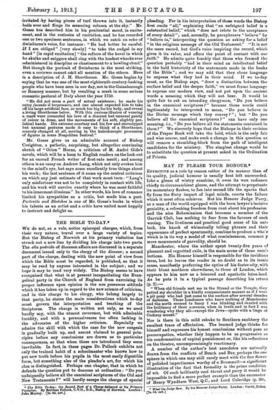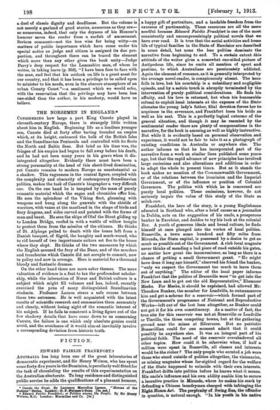MAY IT PLEASE YOUR HONOUR.*
EFFECTIVE as a rule by reason rather of its manner than of its quality, judicial humour is usually best left unrecorded. Like a gleam of wintry sunshine, it owes its wan radiance
chiefly to circumambient gloom, and the attempt to perpetuate
its momentary flashes, to fan into second life the sparks that fly from the flinty impact of legal minds, courts the failure which it most often achieves. But his Honour Judge Parry, as a man of the world equipped with the born lawyer's incisive geniality, a refreshing freedom from cant about his profession
and the nice Bohemianism that becomes a member of the Garrick Club, has nothing to fear from the favours of such wooing. The liveliness and practical good sense of his out- look, his knack of whimsically telling phrases and their
appearance of perfect spontaneity, combine to produce a who'e which is in its way a model of what reminiscences, common y mere monuments of garrulity, should be.
Manchester, where the author spent twenty-five years of pleasant and regretted exile, is the main scene of these reco'- lections. His Honour himself is responsible for the invidious term, but he leaves the reader in no doubt as to its ironic
sense, manifestly preferring the optics of his foster-city, with their blunt northern shrewdness, to those of London, which appears to him now as a leisured and apathetic lotus-land. As he puts it in a typical passage describing his return (p. 2):—
" When old friends met me in the Strand or the Temple, they patted my shoulder in a kindly compassionate manner as if I were a pit pony who had just come to the surface after several decades of darkness. These Londoners who knew nothing of Manchester and the north seemed to fancy I was blinking and dazzled with the brilliancy of their converse, when in truth and in fact I was wondering why they all—except the Jews—spoke with a tinge of Cockney accent."
Nor is there in this mild rebuke to Southern snobbery the smallest trace of affectation. The learned judge thinks for himself and expresses his honest conclusions without pose or preoccupation, whether they happen to be as progressive as his condemnation of capital punishment or, like his reflections on the theatre, uncompromisingly reactionary.
A number of the author's best anecdotes are naturally
drawn from the conflicts of Bench and Bar, perhaps the one sphere in which one may still rarely meet with the fine flower of polished impertinence worthy of a Brummell—a significant illustration of the fact that formality is the prime condition of wit. Of such brilliantly cool thrust and parry it would be impossible to find a more perfect example than the encounter of Henry Wyndham West, Q.C., and Lord Coleridge (p. 90), • Whet the Judge Saw. By his Honour Judge Parry. London : Smith, Elder. [7s. ed. net.] a duel of classic dignity and deadliness. But the volume is not merely a garland of good stories, numerous as they are— so numerous, indeed, that only the dryness of his Honour's humour saves the reader from a surfeit of amusement. Serious comment—not the less wise for being witty—on matters of public importance which have come under his special notice as judge and citizen is assigned its due pro- portion, and throughout there can be traced the element which more than any other gives the book unity—Judge Parry's deep respect for the Lancashire man, of whom he writes, in taking leave (p. 303), "I have been face to face with the man, and feel that his outlook on life is a great asset for our country, and that it has been a privilege to be called upon to minister to his needs, even in the obscure atmosphere of an urban County Court "—a sentiment -which we would echo, with the reservation that the privilege may have been less one-sided than the author, in his modesty, would have us believe.











































 Previous page
Previous page